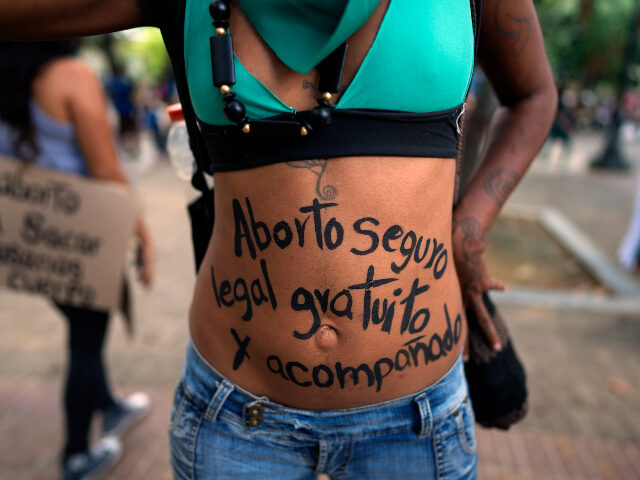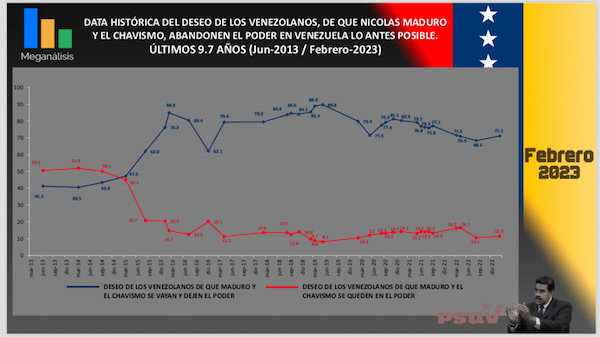Upwards of 84 percent of Venezuelans oppose the legalization of abortion and nearly 73 percent oppose same-sex marriage, a poll by the Venezuelan firm Meganálisis revealed this week, a strikingly conservative stance for a nation that has been officially socialist for over two decades.
Rubén Chirino Leañez, the president and CEO of Meganálisis, told Breitbart News on Monday that a significantly reason for the lack of understanding on where Venezuelans stand on social issues is the fact that Venezuelan politicians – both self-identified “opposition” leaders and socialist dictator Nicolás Maduro, largely avoid social topics out of a “the more the merrier” mentality of attempting to build coalitions among disparate portions of the population. Media attention on the minority of Venezuelans campaigning to legalize abortion or same-sex marriage, he added, makes those sectors of the population appear much larger than polling and other evidence suggests they actually are.
Meganálisis published the results of its February national polling this weekend, showing socialism itself, as an ideology, largely rejected by the majority of Venezuelans. Venezuela has been socialist since the election of late dictator Hugo Chávez in 1999 and has not held a free and fair election in the decade that his successor, Nicolás Maduro, has been in power. Meganálisis conducted its poll between February 9 and 16, 2023, in all of Venezuela’s 23 states and the federal district of Caracas.
Asked if they support Maduro and chavismo generally, 71.1 percent of respondents said they did not. Another 85.1 percent answered affirmatively to the statement, “socialism is synonymous with poor quality of life, migration and family separation, and poverty for all Venezuelans.”
The latest poll results show, Chirino explained to Breitbart News, that chavismo generally “has marked 96 months (eight years) of uninterrupted rejection by the majority of Venezuelans.”
“Approval ratings have remained under 20 percent for the past 73 months (6.08 years) uninterrupted,” he continued. “This allows us to conclude … that Maduro in power and the political scene of the country has produced, is producing, and will produce invariably a high rejection and low approval by Venezuelan society towards these.”
Archival Meganálisis data shows that Maduro enjoyed a grace period following the death of Chávez in March 2013 in which about half of Venezuelans said they wished to see chavismo stay in power. By March 2015, however, the number of people stating they wanted an end to the current government surpassed public support. Rejection of the Maduro regime skyrocketed to 84.9 percent at the end of 2015, when opposition parties won the last free and fair election in the country for the National Assembly majority, and has hovered around 70 percent ever since.
The most recent disapproval ratings are perhaps the most striking given the millions of people who have left the country. According to the United Nations, 7.13 million Venezuelans have fled socialism under Maduro. Venezuela’s current population is about 28 million people; assuming it would be about 35 million if all refugees returned, that means Venezuela has lost about 20 percent of its population.
Even losing 7 million people, who would presumably express disapproval of the regime, Venezuelans overwhelmingly reject their government.
On the social issues, 84.1 percent of respondents said they opposed the legalization of abortion and 72.9 percent said they opposed legalizing same-sex marriages. Only 7.4 percent said they supported legalizing abortion. Both support for abortion and LGBT issues have become cornerstones of left-wing ideology in the West, although leftist movements have historically persecuted suspected gay people as “counterrevolutionaries,” especially in Latin America.
“These results reaffirm that gender ideology has no support in Venezuela and is widely rejected,” Chirino explained.
Venezuela is about 96 percent Catholic and two percent Protestant, resulting in a near-total, 98 percent, Christian population. Catholicism is pervasive enough in society that, unlike the allied dictatorships in neighboring Cuba and Nicaragua, the Maduro regime has not attempted to eradicate religion but, rather, hijack it, rewriting Christian prayers to include Hugo Chávez and rebranding Jesus as a hardline “rebel” chavista.
Maduro once tepidly discussed same-sex marriage legalization, urging the National Assembly in 2020 – by then once again co-opted by the socialists – to pass a law in its favor. The law never came to be and Maduro did not make any major statements on the issue, or abortion, since then, even while facing pressure from the United Nations to expand mothers’ ability to access abortion.
The Venezuelan establishment “opposition” – a coalition of career politicians, many of them with ties to the Socialist International – have also not offered much commentary on social issues. Chirino explained to Breitbart News that politicians in the country have not traditionally used social issues, despite extensive evidence that a majority of Venezuelans tend to agree on them, to win votes, instead avoiding them out of fear that any voter coalition they have created will rupture.
“The Venezuelan politician, in general terms – I am not saying all of them, but the great majority of Venezuelan politicians – are weak in ideology, weak in conduct, weak in how to behave before crossroads, is insecure,” Chirino said, “and has structured himself and formed himself under the thesis of ‘the more the merrier.'”
“The Venezuelan politician thinks that that is what politics is,” he explained, likening building coalitions of social liberals and conservatives to “mixing oil and water.”
“There is no defined political opinion on the part of the government or the part of the opposition sectors [on social issues]. They prefer to avoid the topics,” he explained. “The Venezuelan politician is erratically fixated on trying to mix water and oil, which is a shame because they will never achieve this, it’s a waste of time.”
“What there is is the existence of gay and pro-abortion movements that take advantage of that political silence and obviously, if there is a protest by a gay group asking for rights, if there is a protest by a pro-abortion group asking for rights, that is what comes out in the media,” he continued.
“But politicians? they avoid it,” Chirino concluded, lamenting the loss of an opportunity to build a political coalition.



COMMENTS
Please let us know if you're having issues with commenting.